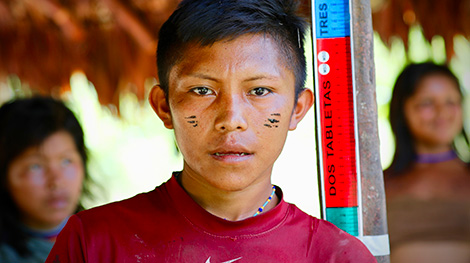 After years of hard work and international cooperation, the onchocerciasis elimination programs of Brazil and Venezuela have confined river blindness to the smallest area yet in the Amazon Rainforest. The achievement comes despite the disruption caused by the COVID-19 pandemic.
Learn more »
After years of hard work and international cooperation, the onchocerciasis elimination programs of Brazil and Venezuela have confined river blindness to the smallest area yet in the Amazon Rainforest. The achievement comes despite the disruption caused by the COVID-19 pandemic.
Learn more »
By Paige Alexander, chief executive officer of The Carter Center
President Carter frequently reminds us of his high school teacher’s words of wisdom: “We must adjust to changing times and still hold to unchanging principles.” At The Carter Center, we practice this precept by holding fast to our founding commitments to defend human rights and relieve human suffering while continually seeking new and improved ways to accomplish our humanitarian goals. Learn more »
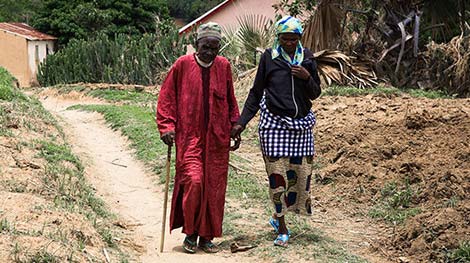 Since 1986, the Center has been an active participant of the American Society for Tropical Medicine and Hygiene (ASTMH), the largest international scientific organization dedicated to reducing the worldwide burden of tropical infectious diseases and improving global health. Carter Center experts have been sharing their findings and engaging with public health peers through ASTMH for decades, and this year it is no different. In 2021, Carter Center Health Program representatives will have 10 presentations at the 2021 ASTMH Annual Meeting, including 5 oral presentations and 5 digital posters highlighting efforts to eliminate river blindness, lymphatic filariasis, and trachoma, as well as integrate malaria and mental health into neglected tropical disease programming and priorities.
Learn more »
Since 1986, the Center has been an active participant of the American Society for Tropical Medicine and Hygiene (ASTMH), the largest international scientific organization dedicated to reducing the worldwide burden of tropical infectious diseases and improving global health. Carter Center experts have been sharing their findings and engaging with public health peers through ASTMH for decades, and this year it is no different. In 2021, Carter Center Health Program representatives will have 10 presentations at the 2021 ASTMH Annual Meeting, including 5 oral presentations and 5 digital posters highlighting efforts to eliminate river blindness, lymphatic filariasis, and trachoma, as well as integrate malaria and mental health into neglected tropical disease programming and priorities.
Learn more »
By Dr. Kashef Ijaz, vice president, health programs
Only one human disease has ever been eradicated; that was smallpox, in 1980 — a tremendous victory for humanity. The term "eradication" is defined as permanent reduction to zero of the worldwide occurrence of infection caused by a specific pathogen, with no risk of its return. Learn more »
On Oct. 25, 12 days after this story was published, members of Sudan’s military seized control of the government. The Carter Center issued a statement condemning the coup and is now monitoring developments there. It remains committed to supporting the people of Sudan. Learn more »
By Dr. Kashef Ijaz, vice president, health programs, and Eve H. Byrd, director, mental health program
Journalists and the field of journalism are often criticized, in part because they have a habit of telling us truths we don’t want to know or discussing topics we don’t want to think about. But good journalists provide a public service by telling us things we need or ought to know and by making us think. What they write or say can affect the way society looks at an issue and educate people about available resources. Learn more »
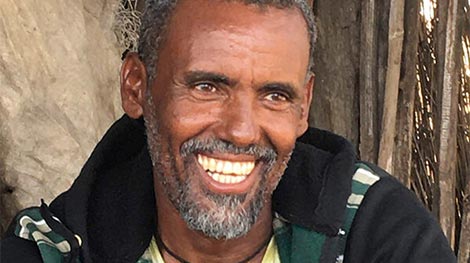 Berihun Takele wants to do everything he can to help his community in Ethiopia’s Amhara region to thrive. Not only is he a kebele leader (similar to a village chief), but he also leads a team of volunteers who protect the village, called Wudi Gemzu, against river blindness by distributing medication and education and catching black flies for testing for the disease.
Learn more »
Berihun Takele wants to do everything he can to help his community in Ethiopia’s Amhara region to thrive. Not only is he a kebele leader (similar to a village chief), but he also leads a team of volunteers who protect the village, called Wudi Gemzu, against river blindness by distributing medication and education and catching black flies for testing for the disease.
Learn more »
By Paige Alexander, chief executive officer, and Kashef Ijaz, vice president, Health Programs
The 76th Session of the United Nations General Assembly opens Tuesday, Sept. 14. It is a time of great anticipation as representatives of 193 member states come together in the great hall to discuss issues and set an agenda for the coming year. World political leaders, including President Joe Biden, will give speeches that will be closely watched for clues and outright declarations regarding a wide variety of international challenges, global health among them. Learn more »
Josh Griffin, a graduate assistant with the Carter Center’s Human Rights Program, participated in the 2020 March on Washington for racial justice in the wake of the murder of George Floyd in Minneapolis. Standing at the foot of the steps of the Lincoln Memorial, Griffin heard inspiring words from several speakers, including the Rev. Martin Luther King Jr.’s son Martin III and 12-year-old granddaughter Yolanda Renee King. Learn more »
This interview with President Carter was conducted in Spring 2020 and originally published in the Bush China Foundation’s 2019/2020 Annual Report. Learn more »
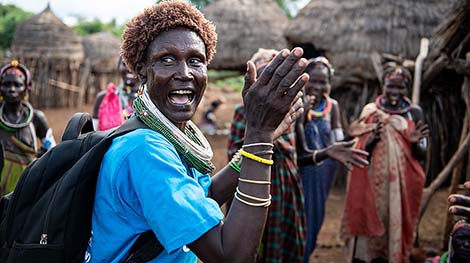 Regina Lotubai Lomare Lochilangole is a natural born motivator. She created an original song and dance to teach her South Sudan community about Guinea worm disease symptoms and prevention and rewards available for reporting suspected cases. The song was so effective that South Sudan’s Ministry of Health created a position for her within the Guinea Worm Eradication Program, titled Social Mobilizer. Lotubai now travels to different parts of the country to train other volunteers to become social mobilizers.
Learn more »
Regina Lotubai Lomare Lochilangole is a natural born motivator. She created an original song and dance to teach her South Sudan community about Guinea worm disease symptoms and prevention and rewards available for reporting suspected cases. The song was so effective that South Sudan’s Ministry of Health created a position for her within the Guinea Worm Eradication Program, titled Social Mobilizer. Lotubai now travels to different parts of the country to train other volunteers to become social mobilizers.
Learn more »
By Susan Hunsinger, program associate, and Katie Conner, former senior program associate, mental health program
Rosalynn Carter is best known for her advocacy for mental health issues, caregiver issues, as co-founder of The Carter Center and founder of the Rosalynn Carter Fellowships for Mental Health Journalism. But there’s more to this "steel magnolia." Here are 24 facts about Rosalynn Carter. Learn more »
By Dr. Kashef Ijaz, vice president, health programs
Completely wiping out a disease is nearly impossible. In all of history, only one human disease has been eradicated — smallpox, in 1980 after a herculean global vaccination campaign that took decades to complete. Polio persists (albeit in small numbers) despite the availability of a highly effective vaccine since the 1950s. Ditto measles. Learn more »
By Dr. Kashef Ijaz, vice president, health programs, and Barbara J. Smith, vice president, peace programs
Back in the turbulent 1960s, there was a popular poster — today it would be a meme on social media — that said, "War is not healthy for children and other living things." Learn more »
 Grab your lunch and join us for 10-minute interviews with election experts on some of the most pressing U.S. election issues.
Learn more »
Grab your lunch and join us for 10-minute interviews with election experts on some of the most pressing U.S. election issues.
Learn more »
The Nigeria Public Health Training Initiative recently transitioned from a Carter Center-assisted project to state-level ownership in each of the six implementing states, including Akwa Ibom, Gombe, Imo, Ogun, Plateau, and Sokoto. Alhaji Abubakar Tambuwal, provost of the College of Nursing Science, Sokoto shares some insights about the innovative project and its impact on Nigeria’s capacity to train healthcare workers. Learn more »
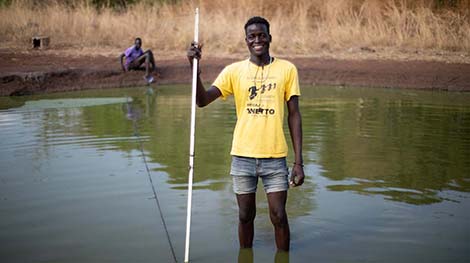 The Carter Center’s Guinea Worm Eradication Program reported just 27 human cases in six African countries in 2020, a dramatic 50% reduction from 2019. Guinea worm infections in animals also were down 20% from the previous year.
Learn more »
The Carter Center’s Guinea Worm Eradication Program reported just 27 human cases in six African countries in 2020, a dramatic 50% reduction from 2019. Guinea worm infections in animals also were down 20% from the previous year.
Learn more »
By Christie Ethridge Diez, 2020-2021 Rosalynn Carter Mental Health Journalism Fellow
Christie Ethridge Diez is a reporter and anchor for Atlanta TV station at 11alive (WXIA) and a 2020-2021 Rosalynn Carter Mental Health Journalism Fellow. In late March 2021, she shared her story of loss, grief, and strength on the Carter Center’s Instagram account after her father’s Alzheimer’s disease diagnosis. Her moving posts, minimally edited, are reproduced here. All photos are courtesy of Christie Ethridge Diez. Learn more »
When new CEO Paige Alexander first saw the cafeteria in the Carter Center’s Atlanta office, paper shamrocks and pots of gold adorned the walls to mark St. Patrick’s Day. Only it wasn’t March. It was June 2020. Learn more »
By Dr. Kashef Ijaz, vice president, health programs
Following on my commentary last month regarding health care capacity building at the community level, it’s fitting now to acknowledge our government partners’ eagerness and ability to exercise ownership of programs taking place within their borders. Learn more »
By Vanessa Scholtens, program associate, Trachoma Control Program
How do we know if a person has trachoma, a bacterial eye disease? A trained worker must examine a person’s inner eyelid and look for the signs. Learn more »
By Dr. Kashef Ijaz, vice president, health programs
The Carter Center’s neglected tropical disease programs treat and prevent Guinea worm disease, trachoma, river blindness, lymphatic filariasis, and schistosomiasis, with the goal to control, eliminate, and eradicate. Beyond the alleviation of the human suffering caused by these illnesses, this work brings ancillary benefits to communities, health systems, and infrastructure that may be just as important. Learn more »
By Paige Alexander, chief executive officer, and Kashef Ijaz, vice president, health programs
The world’s most vulnerable people work hard every day to overcome poverty and disease. They aren’t interested in handouts, but with a hand up they can get the resources they need to surmount obstacles to prosperity and peace. Learn more »
By Paige Alexander, chief executive officer
When new CEO Paige Alexander first saw the cafeteria in the Carter Center’s Atlanta office, paper shamrocks and pots of gold adorned the walls to mark St. Patrick’s Day. Only it wasn’t March. It was June 2020. Learn more »
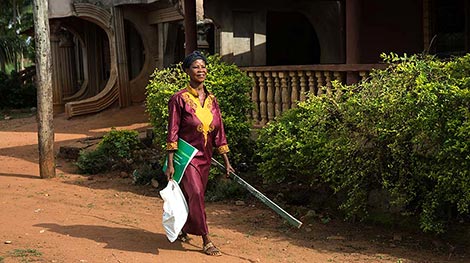 Mass drug administration, in which entire communities receive drug treatment to halt disease transmission, was interrupted or delayed, but intense work went on behind the scenes to develop sets of COVID-safe procedures.
Learn more »
Mass drug administration, in which entire communities receive drug treatment to halt disease transmission, was interrupted or delayed, but intense work went on behind the scenes to develop sets of COVID-safe procedures.
Learn more »
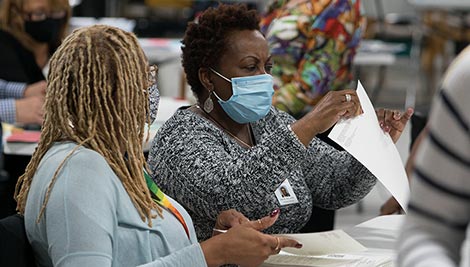 In November, the state of Georgia undertook the largest hand tally of election ballots ever performed in the United States. And The Carter Center had a front-row seat.
Learn more »
In November, the state of Georgia undertook the largest hand tally of election ballots ever performed in the United States. And The Carter Center had a front-row seat.
Learn more »
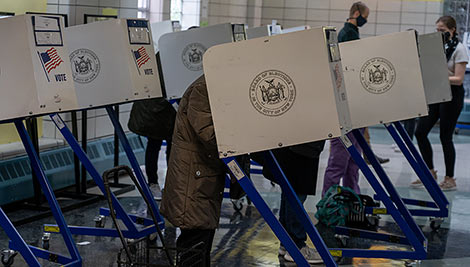 The 2020 U.S. election was like none before it. Polarization was at an all-time high, with many on both sides mistrusting each other and the process itself. The pandemic introduced further complications, challenging election officials to find ways to ensure accessibility while keeping voters safe. Because of this, The Carter Center chose to do something it had never done before—get involved in a U.S. election.
Learn more »
The 2020 U.S. election was like none before it. Polarization was at an all-time high, with many on both sides mistrusting each other and the process itself. The pandemic introduced further complications, challenging election officials to find ways to ensure accessibility while keeping voters safe. Because of this, The Carter Center chose to do something it had never done before—get involved in a U.S. election.
Learn more »
By Dr. Kashef Ijaz, vice president, health programs
Global mental health has been called the “silent,” “parallel,” or “next” pandemic. Learn more »
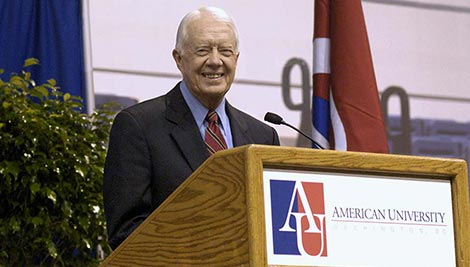 In 2005, former U.S. President Jimmy Carter and former Secretary of State James A. Baker III joined forces to chair the bipartisan Commission on Federal Election Reform.
Learn more »
In 2005, former U.S. President Jimmy Carter and former Secretary of State James A. Baker III joined forces to chair the bipartisan Commission on Federal Election Reform.
Learn more »
By Helen Robinson, associate director, public policy
Many Georgians face barriers to accessing mental health care. While this is not a new problem, The Carter Center believes it is urgent that state leaders address the issue during the current public health crisis. Learn more »
 The Carter Center is working closely with the Federal Ministry of Health in Ethiopia to eliminate river blindness (onchocerciasis) and lymphatic filariasis throughout that East African nation. Essential to the effort are thousands of volunteers called community-directed distributors, or CDDs, who are chosen by their own communities and do all the work of carefully administering medicine and keeping detailed records. Click through to meet a few of them.
Learn more »
The Carter Center is working closely with the Federal Ministry of Health in Ethiopia to eliminate river blindness (onchocerciasis) and lymphatic filariasis throughout that East African nation. Essential to the effort are thousands of volunteers called community-directed distributors, or CDDs, who are chosen by their own communities and do all the work of carefully administering medicine and keeping detailed records. Click through to meet a few of them.
Learn more »
The Carter Center is honored to join The Saporta Report’s Global Health Thought Leaders rotation. For readers who may not be familiar with our work, allow us to introduce ourselves. Learn more »
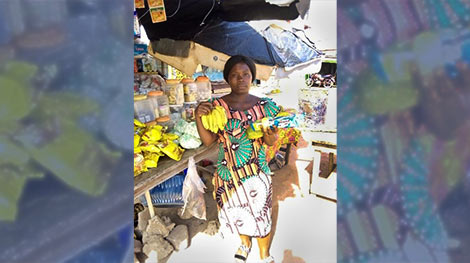 Marthaline Nuah is determined to get a college education. There is no university in her village in northeastern Liberia, so she left home and moved in with an aunt who lives in Saniquellie, which is the capital of Nimba County and home to a community college. Her aunt gave her the money to pay for college entrance exams, which she passed, and for the college’s admission fees. But there wasn’t enough left over for courses.
Learn more »
Marthaline Nuah is determined to get a college education. There is no university in her village in northeastern Liberia, so she left home and moved in with an aunt who lives in Saniquellie, which is the capital of Nimba County and home to a community college. Her aunt gave her the money to pay for college entrance exams, which she passed, and for the college’s admission fees. But there wasn’t enough left over for courses.
Learn more »
By Laura Neuman, director, Rule of Law Program
Laura Neuman, senior advisor to The Carter Center, discusses the Inform Women, Transform Lives campaign, what it’s all about, and why it matters. Learn more »
Growing up, Greg Noland voraciously read National Geographic magazines. From his home near Dallas, Texas, Noland became fascinated with other cultures and seeing the world. Learn more »
Liberians now have a new, easy way to file complaints – or compliments – about police officers. With support from The Carter Center, a Liberian company has developed the Find Officer app, part of a larger effort to build trust in the police by increasing accountability. Learn more »
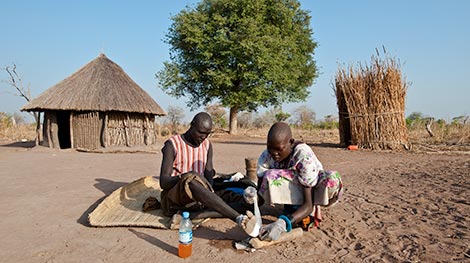 Despite the challenges of the COVID-19 pandemic, the number of human Guinea worm cases was cut in half to just 27* in 2020, The Carter Center announced Tuesday. The 27 human cases of Guinea worm disease across six African countries mark a 50% decline from the number of cases reported in 2019. Guinea worm infections in animals fell 20% in the same period, the Center reported.
Learn more »
Despite the challenges of the COVID-19 pandemic, the number of human Guinea worm cases was cut in half to just 27* in 2020, The Carter Center announced Tuesday. The 27 human cases of Guinea worm disease across six African countries mark a 50% decline from the number of cases reported in 2019. Guinea worm infections in animals fell 20% in the same period, the Center reported.
Learn more »
By Dr. Kashef Ijaz, vice president, health programs
The observance of World Neglected Tropical Disease Day on Jan. 30 (following the public launch of the 2030 NTD Road Map by the WHO on Jan. 28) prompts me to reflect on my good fortune in overseeing the Carter Center’s tireless work to free people from an array of illnesses that cause untold misery and perpetuate the cycle of poverty. Learn more »
He could have taken his advanced degrees from Boston and Fordham universities and found a comfortable, high-paying job in the United States. But Dr. Hubert Zirimwabagabo had a different goal for the early years of his career. Learn more »
Sometimes journalists set out to find one story and end up telling a different one. When Myriam Vidal Valero and Rodrigo Perez Ortega received a joint journalism fellowship from The Carter Center in mid-2019, their plan was to document the emotional trauma faced by migrant families separated by U.S. policy at the U.S.-Mexico border. Learn more »
Please sign up below for important news about the work of The Carter Center and special event invitations.